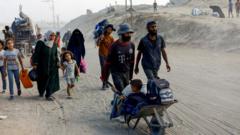Why Are Thousands of Palestinians Fleeing Gaza City Amid Israeli Troop Advances?

Published: 2025-09-17 10:20:38 | Category: technology
The ongoing conflict in Gaza has triggered a humanitarian crisis, with thousands of Palestinians fleeing Gaza City amid escalating violence and an Israeli ground offensive. This situation has resulted in severe overcrowding in designated humanitarian areas, inadequate living conditions, and skyrocketing costs for those attempting to escape. The Israeli military aims to eliminate Hamas fighters while facing widespread international condemnation for its actions.
Last updated: 12 October 2023 (BST)
Key Takeaways
- Thousands of Palestinians are fleeing Gaza City amid an Israeli ground offensive.
- Major humanitarian concerns arise due to overcrowding in designated areas and high costs of evacuation.
- The offensive has led to international condemnation, with calls for urgent intervention from aid agencies.
- Reports suggest significant civilian casualties, with the UN warning of a deepening humanitarian crisis.
- Israel's military strategy includes targeting Hamas strongholds while facing backlash for its tactics.
The Escalating Conflict in Gaza
The situation in Gaza has reached a critical point as Israel launched a major ground offensive on Gaza City, a move described by military officials as necessary to eliminate what they term Hamas's "last stronghold." This offensive follows an intense period of bombardment and military engagement, with reports indicating that Israel has targeted over 150 sites linked to Hamas within just two days.
As part of this military campaign, the Israeli military has claimed to be targeting approximately 3,000 Hamas fighters. Their aim is not just to defeat these fighters but also to secure the release of hostages taken during the initial Hamas-led attack on 7 October 2023, which resulted in significant casualties on both sides.
Humanitarian Crisis and Displacement
The ground offensive has precipitated a mass exodus from Gaza City, with large groups of Palestinians attempting to flee south along designated routes. The Israel Defense Forces (IDF) recently announced the opening of a second evacuation route, but many Palestinians face insurmountable financial barriers to their escape.
Reports indicate that the cost of basic transportation has surged dramatically; for instance, hiring a small truck to transport a family can now cost around 3,500 shekels (approximately £660), while the price of tents for displaced families has also skyrocketed. This financial burden has forced many families to make desperate decisions, such as selling personal possessions to cover evacuation costs.
Conditions in Humanitarian Areas
The designated humanitarian areas, notably in al-Mawasi, are facing severe overcrowding. Aid organisations have expressed concerns that these areas are ill-equipped to support the influx of people, with estimates suggesting that approximately 2 million Palestinians could be forced into these zones. Reports indicate that many families who have followed military orders to evacuate have found no available space for shelter and have been compelled to return to northern Gaza.
The Response from International Aid Agencies
In light of the unfolding humanitarian disaster, leaders from over 20 international aid agencies have called for immediate action from global leaders. They describe the current conditions in Gaza as "unconscionable" and demand urgent intervention to alleviate the suffering of civilians caught in the crossfire. The United Nations has raised alarms about the deteriorating situation, with a UN-backed food security body declaring famine conditions in Gaza City.
The situation is further complicated by the ongoing conflict and military operations. As the IDF intensifies its offensive, humanitarian groups warn that the civilian population is being pushed into an even deeper catastrophe. The lack of adequate resources and support exacerbates the plight of those fleeing violence.
International Condemnation and Political Responses
The Israeli offensive has drawn widespread criticism from the international community. UN human rights chief Volker Türk condemned the actions as "totally and utterly unacceptable," while UK Foreign Secretary Yvette Cooper described the offensive as "utterly reckless and appalling." Such statements reflect growing concerns over the humanitarian impact of military actions and the need for a balanced approach to resolving the conflict.
In contrast, US Secretary of State Marco Rubio indicated a level of support for Israel's military operations, suggesting that there are times when negotiation is not feasible with groups like Hamas. This divergence in international responses highlights the complexity of the geopolitical landscape surrounding the conflict.
Hostage Crisis and Public Protests
The situation is further complicated by the ongoing hostage crisis, with families of those still held by Hamas protesting against the military offensive. They argue that the aggressive military tactics could endanger their loved ones. This sentiment was echoed in statements made by family members who expressed fears that military actions could lead to unintended consequences for the hostages, including potential harm or fatalities.
Casualties and Ongoing Violence
Since the onset of the conflict, the toll on civilians has been staggering. According to Gaza's health ministry, at least 64,964 individuals have been reported killed due to Israeli military actions, with a significant proportion being women and children. This statistic raises grave concerns about the impact of military operations on non-combatants and the ethical implications of continuous bombardment.
As the conflict persists, the humanitarian situation is expected to worsen. The UN has warned that an escalation of military actions will only deepen the suffering of civilians already grappling with the repercussions of war. The urgency for diplomatic solutions is becoming increasingly apparent, with calls for humanitarian ceasefires and negotiations gaining traction among various sectors of the international community.
Looking Ahead: What Happens Next?
The coming days and weeks are critical for both the people of Gaza and the broader political landscape. As the Israeli military continues its operations, the humanitarian crisis is likely to escalate, with more people fleeing and seeking refuge in overcrowded areas. The situation demands urgent attention and intervention from the international community to prevent further loss of life and to provide essential support to those affected.
On the ground, families continue to navigate the complexities of displacement, facing financial hardships and inadequate living conditions. The international response will play a crucial role in shaping the future of the region and addressing the immediate needs of civilians caught in the conflict.
FAQs
What is the current situation in Gaza City?
The situation in Gaza City is dire, with thousands fleeing due to an Israeli ground offensive. Overcrowding in humanitarian areas is resulting in severe living conditions and rising costs for those attempting to escape.
Why are Palestinians fleeing Gaza City?
Palestinians are fleeing Gaza City primarily due to escalating violence and military operations by Israel aimed at targeting Hamas fighters, leading to significant civilian casualties and a deteriorating humanitarian situation.
What are the conditions like in humanitarian areas?
Conditions in humanitarian areas are extremely overcrowded and inadequate, struggling to accommodate the influx of displaced individuals. Many families report finding no space to shelter, forcing them to return north.
How has the international community responded to the crisis?
The international community has expressed widespread condemnation of the Israeli offensive, with calls for urgent humanitarian intervention from various aid agencies and human rights organisations.
What is the status of hostages taken by Hamas?
Families of hostages taken by Hamas are actively protesting, fearing that the military offensive could endanger their loved ones. Reports suggest that some hostages are still alive, but their fate remains uncertain amidst the violence.
Conclusion
The situation in Gaza remains precarious as conflict continues to unfold. The urgent need for humanitarian support is evident, and the call for international intervention grows louder. As the crisis develops, it is crucial to consider the implications of military actions on innocent lives and seek pathways to peace. How will the international community respond to the escalating crisis in Gaza? #GazaCrisis #HumanRights #InternationalResponse


